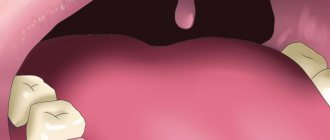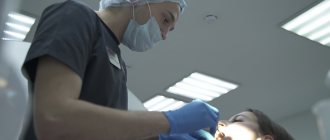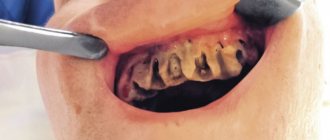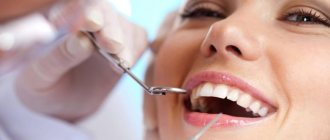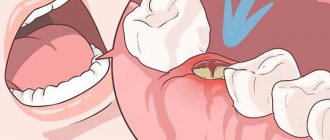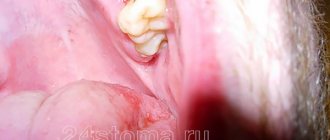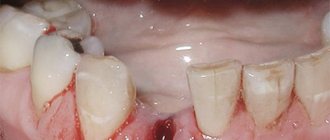Pharmacodynamics and pharmacokinetics
Iodine-containing antiseptic . The antiseptic effect is provided by molecular iodine. During the treatment of the skin, the resorptive effect of iodine is manifested: it enhances metabolism , accelerates dissimilation , has a proteolytic effect, and takes part in the process of synthesizing the hormones T3 and T4 .
Under the influence of ethanol , the excretion of iodine slows down and its irritating effect on tissues decreases. A bactericidal effect against gram-positive flora, streptococci , Protea , Escherichia coli and most gram-negative bacteria .
The drug affects the vital activity of yeast and pathogenic fungi , and has a detrimental effect on the spores of anthrax . Pseudomonas aeruginosa is resistant to iodine . The medicine is low-toxic.
What do doctors recommend?
For several days, it is necessary to rinse the oral cavity with an antiseptic solution, which will prevent the entry of microbes from the external environment through the wound surfaces of the gums. The number and duration of rinses is determined by the attending physician. Rinse solutions should be no cooler than room temperature and no hotter than 37 degrees. The simplest and most inexpensive option is a solution of baking soda (1 teaspoon per glass of water). In addition, rinsing can be done using pharmaceutical products.
Rinses from the pharmacy
| Iodine-containing products | Iodinol, yox (spray) |
| Chlorine-containing | Chlorhexidine, miramistin, eludril, |
| Nitrofuran | Furacillin |
| Based on hexetidine | Stomatidin, hexoral |
| Vegetable | Chlorophyllipt, calendula tincture, |
| Antiseptic lozenges | Faringosept, septolete, grammidin |
| Means to accelerate the healing of mucous membranes | Rotocan, dental paste solcoseryl, stomatophyte, propolis spray, sea buckthorn oil. |
| Infection Control Products | Antibiotics, bacteriophages (staphylococcal bacteriophage, pyobacteriophage) |
Indications for use
The use of Iodinol in gynecology is limited to antiseptic treatment of the surgical surface.
For myalgia , injuries, infectious and inflammatory lesions of the skin, the medication is used externally.
For varicose and trophic ulcers , chemical and thermal burns of I-II degree, purulent otitis media , chronic tonsillitis and atrophic rhinitis , it is used topically. For tertiary syphilis atherosclerosis , it is possible to use the medicine internally.
Iodinol
Manufacturer: TULA PHARMACEUTICAL FACTORY LLC (Russia)
◊ solution for local and external approx. 1 mg/ml: 40 ml, 50 ml, 80 ml or 100 ml vial, 4.5 l bottle Reg. No.: LP-001828
Clinical and pharmacological group:
Antiseptic for external use
Release form, composition and packaging
◊ Solution for local and external use
in the form of a dark blue liquid with a characteristic odor, foaming when shaken; Traces of foaming are allowed on the unfilled part of the bottle.
| 1 ml | |
| iodine | 1 mg |
Excipients:
potassium iodide 3 mg, polyvinyl alcohol 9 mg, purified water to 1 ml.
40 ml - orange glass bottles (1) with screw caps or spray nozzle - cardboard packs. 50 ml - orange glass bottles (1) with screw caps or spray nozzle - cardboard packs. 80 ml - orange glass bottles (1) with screw caps or spray nozzle - cardboard packs. 100 ml - orange glass bottles (1) with screw caps or spray nozzle - cardboard packs. 40 ml - polymer bottles (1) with stoppers-droppers and caps or spray nozzle - cardboard packs. 50 ml - polymer bottles (1) with dropper stoppers and caps or spray nozzle - cardboard packs. 80 ml - polymer bottles (1) with dropper stoppers and caps or spray nozzle - cardboard packs. 100 ml - polymer bottles (1) with dropper stoppers and caps or spray nozzle - cardboard packs. 40 ml - bottles made of polyethylene terephthalate (1) with polymer caps or a spray nozzle - cardboard packs. 50 ml - bottles made of polyethylene terephthalate (1) with polymer caps or a spray nozzle - cardboard packs. 80 ml - bottles made of polyethylene terephthalate (1) with polymer caps or a spray nozzle - cardboard packs. 100 ml - bottles made of polyethylene terephthalate (1) - cardboard packs with polymer caps or a spray nozzle. 40 ml - orange glass bottles with screw caps or spray nozzle - group packaging. 50 ml - orange glass bottles with screw caps or spray nozzle - group packaging. 80 ml - orange glass bottles with screw caps or spray nozzle - group packaging. 100 ml - orange glass bottles with screw caps or spray nozzle - group packaging. 40 ml - polymer bottles with dropper stoppers and caps or spray nozzle - group packaging. 50 ml - polymer bottles with dropper stoppers and caps or spray nozzle - group packaging. 80 ml - polymer bottles with dropper stoppers and caps or spray nozzle - group packaging. 100 ml - polymer bottles with dropper stoppers and caps or spray nozzle - group packaging. 40 ml - bottles made of polyethylene terephthalate with polymer caps or a spray nozzle - group packaging. 50 ml - bottles made of polyethylene terephthalate with polymer caps or a spray nozzle - group packaging. 80 ml - bottles made of polyethylene terephthalate with polymer caps or a spray nozzle - group packaging. 100 ml - bottles made of polyethylene terephthalate with polymer caps or a spray nozzle - group packaging. 4.5 l - polyethylene terephthalate bottles.
Description of the active components of the drug "Iodine"
pharmachologic effect
Elemental iodine has pronounced antimicrobial properties. Elemental iodine preparations are characterized by a pronounced local irritating effect on tissue, and in high concentrations, a cauterizing effect. The local effect is due to the ability of elemental iodine to precipitate tissue proteins. Preparations that remove elemental iodine have a much less pronounced irritating effect, and iodides have local irritating properties only in very high concentrations.
The nature of the resorptive effect of elemental iodine and iodides preparations is the same. During the resorptive effect, iodine preparations have the most pronounced effect on the functions of the thyroid gland. In case of iodine deficiency, iodides help restore impaired synthesis of thyroid hormones. With normal iodine content in the environment, iodides inhibit the synthesis of thyroid hormones, the sensitivity of the thyroid gland to pituitary TSH decreases and its secretion by the pituitary gland is blocked. The effect of iodine preparations on metabolism is manifested by increased dissimilation processes. In atherosclerosis, they cause a slight decrease in the concentration of cholesterol and beta-lipoproteins in the blood; in addition, they increase the fibrinolytic and lipoproteinase activity of blood serum and slow down the rate of blood clotting.
Accumulating in syphilitic gums, iodine promotes their softening and resorption. However, the accumulation of iodine in tuberculosis lesions leads to an increase in the inflammatory process in them. The release of iodine by the excretory glands is accompanied by irritation of the glandular tissue and increased secretion. This is due to the expectorant effect and stimulation of lactation (in small doses). However, in large doses, iodine preparations can cause suppression of lactation.
Indications
For external use: infectious and inflammatory skin lesions, injuries, wounds, myalgia.
For local use: chronic tonsillitis, atrophic rhinitis, purulent otitis media, trophic and varicose ulcers, wounds, infected burns, fresh thermal and chemical burns of I-II degree.
For oral administration: prevention and treatment of atherosclerosis, tertiary syphilis.
Dosage regimen
When applied externally, iodine is used to treat damaged areas of the skin.
For oral administration, the dose is set individually, depending on the indications and age of the patient.
Topically used for washing lacunae and supratonsillar spaces - 4-5 procedures at intervals of 2-3 days, for irrigation of the nasopharynx - 2-3 times a week for 2-3 months, for instillation into the ear and rinsing - for 2-4 weeks; in surgical practice and for burns, gauze napkins applied to the affected surface are moistened as needed.
Side effect
For external use:
rarely - skin irritation; with prolonged use on large wound surfaces - iodism (rhinitis, urticaria, Quincke's edema, salivation, lacrimation, acne).
When taken orally:
allergic skin reactions, tachycardia, nervousness, sleep disturbances, increased sweating, diarrhea (in patients over 40 years of age).
Contraindications
Hypersensitivity to iodine. For oral administration - pulmonary tuberculosis, nephritis, nephrosis, adenomas (including the thyroid gland), furunculosis, acne, chronic pyoderma, hemorrhagic diathesis, urticaria, pregnancy, children under 5 years of age.
Pregnancy and lactation
Contraindicated for oral administration during pregnancy.
Use for renal impairment
For nephritis and nephrosis, it is contraindicated for oral administration.
Application for children
Contraindicated for oral administration to children under 5 years of age.
special instructions
With prolonged use, phenomena of iodism are possible.
Drug interactions
Pharmaceutically incompatible with essential oils, ammonia solutions, white sedimentary mercury (an explosive mixture is formed). An alkaline or acidic environment, the presence of fat, pus, and blood weaken the antiseptic activity. Reduces the hypothyroid and goitrogenic effects of lithium preparations.
Drug interactions
Pharmaceutically incompatible with essential oils, ammonia solutions, white sedimentary mercury (an explosive mixture is formed). An alkaline or acidic environment, the presence of fat, pus, and blood weaken the antiseptic activity. Reduces the hypothyroid and goitrogenic effects of lithium preparations.
Contraindications
contraindications are known :
- hypersensitivity to iodine ;
- history of allergic responses.
Iodinol can be prescribed to children only from 5 years of age.
For urticaria , chronic pyoderma , adenoma , pulmonary tuberculosis , acne , furunculosis , nephrosis , nephritis , hemorrhagic diathesis, taking the medication orally is contraindicated.
Side effect
Taking the solution orally causes increased sweating , rapid heartbeat, nervousness , insomnia , diarrhea (typical for older people), and allergic responses. Application to skin may cause irritation.
Long-term treatment of extensive wound surfaces can lead to iodism (salivation, urticaria, acne, Quincke's edema , lacrimation).
Side effects, overdose
If the drug is used for treatment not according to the instructions, a person may experience various undesirable symptoms. This usually does not occur when Iodinol is used as directed without overdose. An exception may be the situation when the patient has hypersensitivity to the components of the formula. In case of intolerance to the drug, note:
- local tissue irritation;
- rashes, allergies;
- breathing disorder.
If the product is ingested (when gargling) and iodism develops, the following symptoms occur:
- respiratory depression;
- sore throat;
- burning in the mouth;
- metallic taste;
- increased salivation;
- the appearance of skin allergies;
- any disorders of the gastrointestinal tract - nausea, indigestion, vomiting, cramps;
- swelling of the eyelids, redness of the eyes.
If salivation increases as a result of treatment with iodinol, angioedema or other phenomena not specified in the instructions for use occur, it is necessary to rinse the stomach and immediately call a doctor
Advice. Treatment is symptomatic. In this case, it is necessary to check the functioning of the thyroid gland.
If the drug is taken orally, tachycardia may develop, insomnia or sweating may occur.
Instructions for use of Iodinol (Method and dosage)
Locally, Iodinol is used to lubricate the tonsils, apply bandages, and for rinsing.
For the treatment of chronic tonsillitis, regular washing of the supratonsillar spaces and tonsils is recommended.
How to gargle with Iodinol: single dosage – 50 ml, 4-5 rinses daily for three days.
How to dilute Iodinol for gargling : add a solution of the drug to 100 ml of boiled water until the water turns dark yellow. The resulting solution is suitable for rinsing.
Treatment of chronic purulent otitis : for epitympanitis, the attic is washed, and for mesotympanitis, a solution is instilled (5-8 drops per procedure). Duration of therapy is up to 4 weeks.
Therapy for chronic atrophic rhinitis recommends first softening and removing the crusts, and then spraying the nasal cavity and nasopharynx (2-3 times a week, course - 3 months).
For ulcers ( varicose , trophic ), gauze bandages soaked in the solution are applied. Dressing is carried out 2 times a day, each time soaking the gauze with a solution, but without removing it. A week later, a local bath is prescribed, and procedures with gauze bandages are continued until complete healing.
Treatment of infected burns and purulent wound lesions includes the application of a special loose gauze bandage soaked in the drug.
Features of treatment with Iodinol
Among the main indications for the treatment of stomatitis with iodine preparations are:
- rashes on the lips, inner cheeks, gums, palate;
- traumatic stomatitis, when there is a risk of secondary infection;
- the presence of herpes, prevention of the spread of herpes infection into the oral cavity;
- purulent inflammation in the oral cavity, the presence of aphthae, ulcers, thermal or chemical burns;
- stomatitis, which is accompanied by bad breath and exudate from the affected areas.
Main contraindications for the use of iodine in children and adults:
- allergic reactions, increased inflammation after using iodine;
- hypersensitivity to iodine preparations;
- improper use of the product, failure to follow instructions;
- diseases of the thyroid gland – thyrotoxicosis.
A relative contraindication may be stomatitis caused by a thermal factor. Treating a burn with iodine can only increase inflammation, since iodine itself cauterizes wounds. In this case, it is very important to follow the dosage and not get carried away with frequent lubrication of the mucous membrane.
The effectiveness of iodine treatment is individual for everyone; you can see the result 7-10 after the start of rinsing, lotions and lubrication. If the stomatitis is primary, cure is guaranteed. Treatment of secondary stomatitis with iodine will only temporarily relieve the symptomatic complex, but the disease will return again.
Iodinol price, where to buy
The price in Ukraine for this medication is 50 UAH. You can buy Iodinol at the pharmacy.
- Online pharmacies in RussiaRussia
ZdravCity
- Iodinol solution for places
and adv. approx. fl. with 50ml sprayer Tula Pharmaceutical Factory LLC 83 RUR order
Iodinol: price
The product is sold in glass bottles of 50 ml or 100 ml. Some manufacturers have equipped their bottles with spray nozzles. It is worth keeping in mind that the presence of such a sprayer does not mean that the product is ready for application to the oral cavity or nasal mucous membranes. The nozzle makes it easier to treat the skin area around the wound. Only the presence of a separate footnote in the instructions attached to the bottle can indicate the concentration of the active substance and the permissible use of the solution unchanged for rinsing.
You can buy a 50 ml bottle without a spray nozzle for 30 rubles. Depending on the name of the manufacturer, the price may vary. The presence of a spray bottle affects pricing. With it, a bottle of the same volume will cost from 100 rubles.

